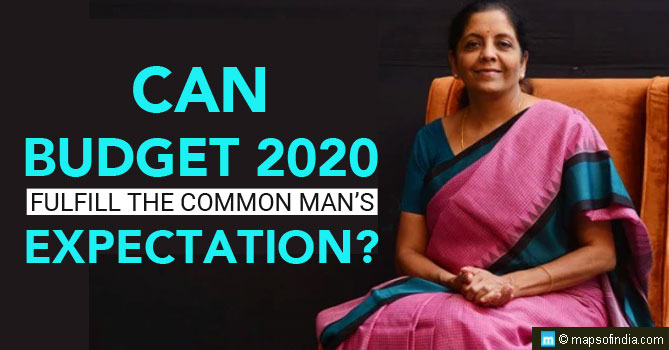
The inequality of wealth in India is a shocking one, so the rich-poor gap is widening. As per a study by Oxfam, it is recently revealed that one per cent of India’s rich people have more than four-times the wealth held by 953 million people, which is 70 per cent of the country’s total population.
What is even more interested is that 63 billionaires of India keep more wealth than the full-year Budget. Imagine where the poor are standing and how grave is their situation.
Considering the massive divide between the rich and poor, every year, the Budget presented in the Lok Sabha bears many expectations to improve the living conditions of the poor, to provide tax relief to the common man and it is expected that the government will engage in policies that reduce this divide. Given the upcoming Budget 2020, here are some sectors where people expect the government to come to the rescue.
Save economy from the slump
In the forthcoming Budget 2020, the biggest challenge before the Modi government is to rescue the Indian economy from the recession phase. The Indian economy is projected to grow at 5% in the current fiscal, the slowest growth rate since 2012-13, which would make things more complicated as retail inflation has touched a five-and-a-half-year high of 7.35% in December.
Finance Minister Nirmala Sitharaman is gearing up to present the Union Budget on February 1. The nominal GDP growth rate and unemployment have declined and are at a 42-year low, rising inflation, liquidity crunch, and so on are the vital issues staring to be resolved by the Union Budget 2020-21 as it will be presented next month.
Several sectors on receiving end
The slow growth rate in several vital industries, including automobile, real estate, construction and manufacturing are the critical tasks for the finance minister to be addressed. All these sectors are facing a tough time and their significant losses leading to a decline in their contribution to the GDP along with lowering the labour employment.
Immediate measures required
Seeing the present situation, the government is required to take relieving and speedy steps to mobilise such sectors along with concentrating on long term plans to boost the industries and aid the common man by slashing personal income tax. But it won’t be easy as the exchequer is staggering under the impact of revenue foregone because of slash in the corporate tax rate.
Custom duty may hike
The government is likely to hike customs duty on several items like paper, footwear, rubber items and toys in the upcoming Budget 2020 to promote ‘Make in India’ and increase manufacturing growth. The Commerce and Industry Ministry in its Budget recommendations has proposed to the Finance Ministry to increase the custom duty on several items like new pneumatic tyres of rubber to 40% from the current 10-15%. While on footwear, the suggestion has been given to hike 35% from 25% in the present time. Hiking tax on footwear, paper, toys and other common commodities is going to increase the burden on the common man. This is opposite to what the common is expecting from the government.
Stress on the power supply
The second Union Budget of the Modi government would be crucial as it needs to overcome the slowdown of the economy apart from this, improving the standard of living of the people. It is expected that the Budget is also likely to announce Rs 2.86 trillion electricity distribution scheme to ensure continuous power supply to all the houses.
Govt mulls to abolish DDT
The government is mulling to remove dividend distribution tax (DDT) in the 2020-21 Budget and instead, planning to tax the shareholders receiving dividends to improve investor sentiment by addressing the multiplicity of taxes and decrease the effective tax rates for companies. But for the implementation of this move, it requires a change in Section 115 (O) of the Income-tax Act. So, the common man is expecting another landmark decision by the government.
Govt slashes many taxes
The Central government has left no stone unturned and announced a reduction in the corporate tax rate, trimming in the Goods and Services Tax (GST) rates on selected items, withdraw ‘angel tax’ for entities registered with the Department for Promotion of Industry and Internal Trade (DPIIT), etc. in the previous Budget. Such steps have been taken to revive industrial growth and increase consumption. Corporate tax has been slashed to encourage companies to spend more.
Hopefully, the intention of this year’s Budget 2020 would be towards improving the income of consumers through personal income tax cuts, employment generation, income support schemes, and prioritise manufacturing to encourage industrial growth and investments.





